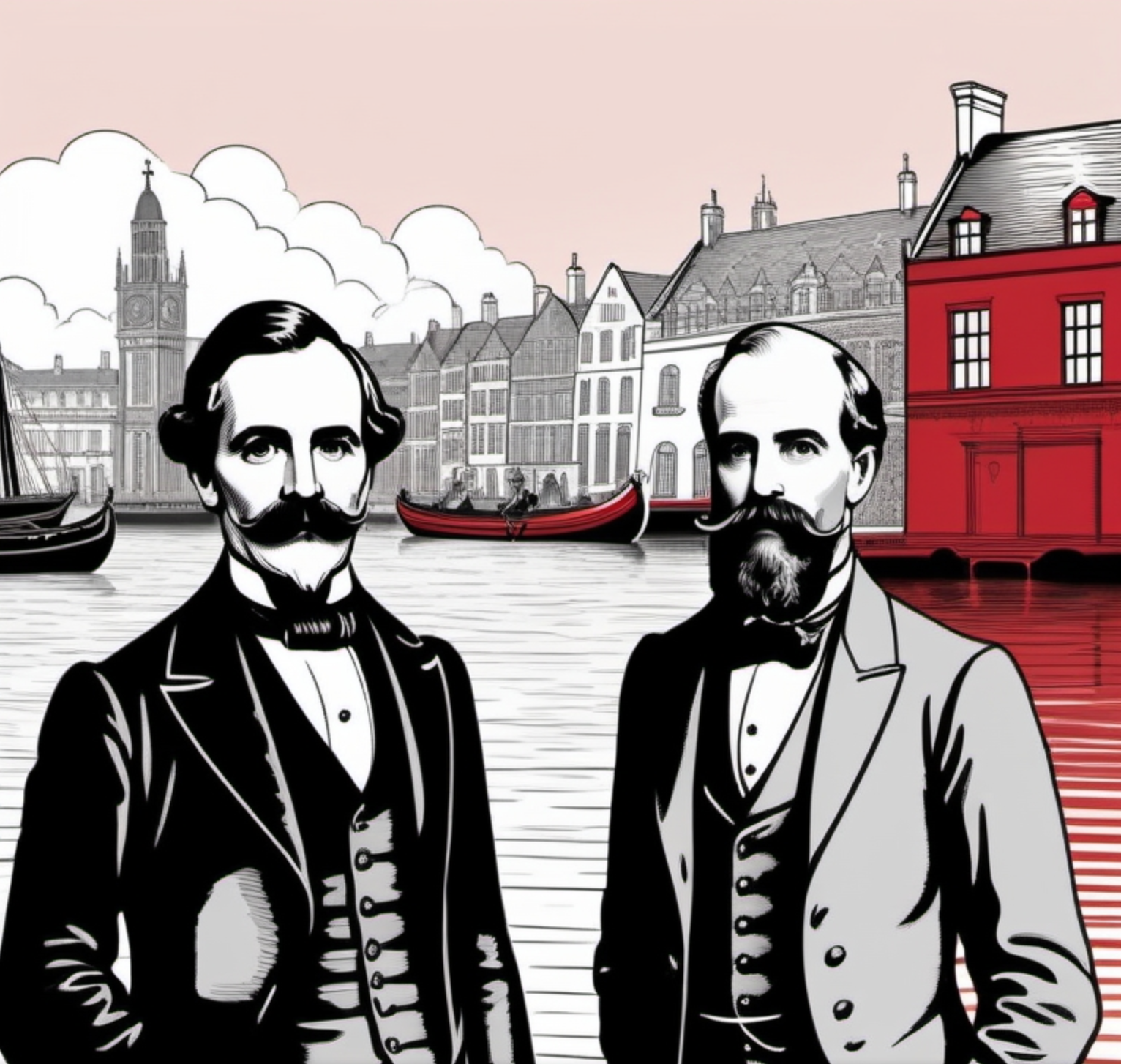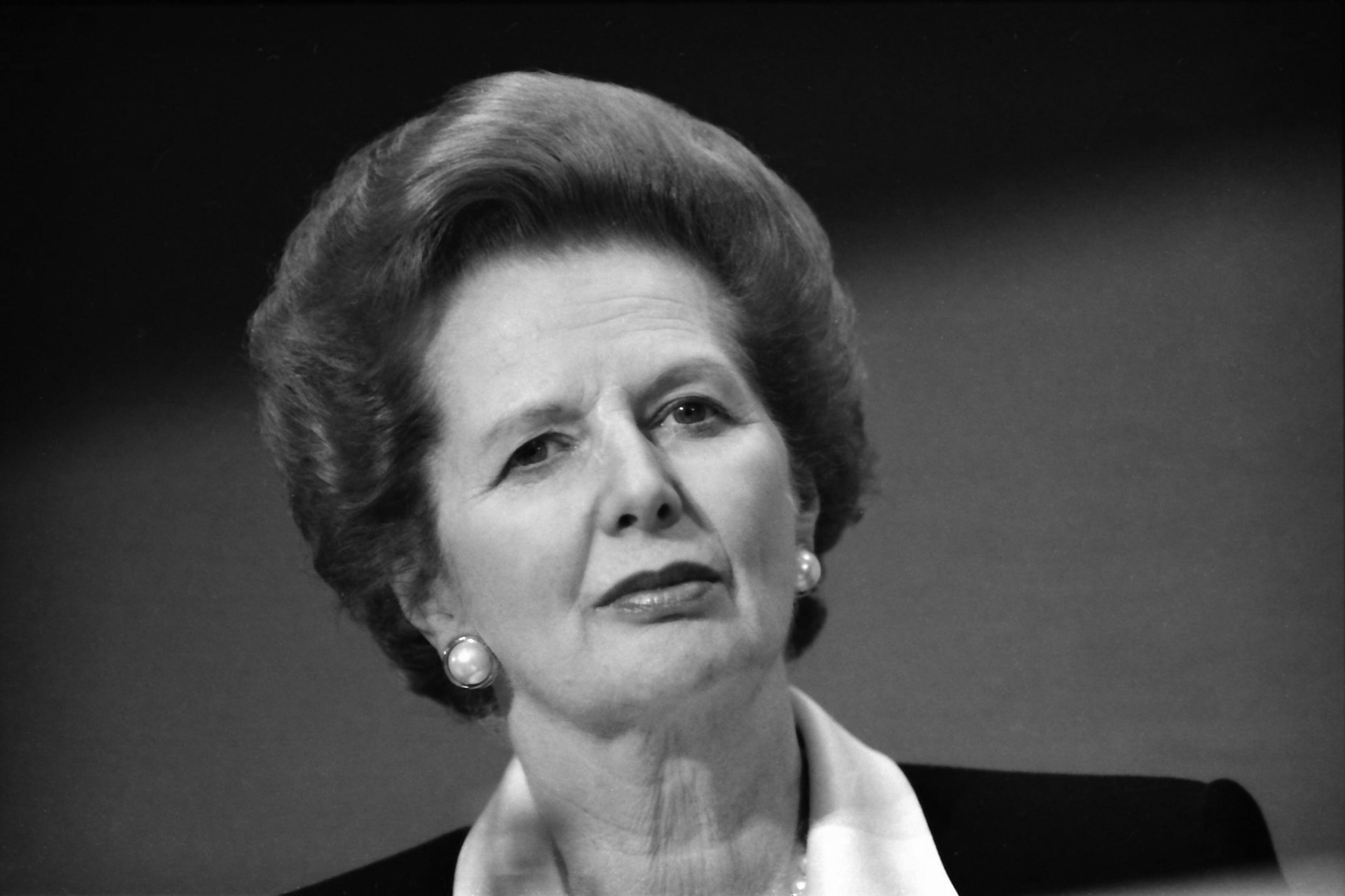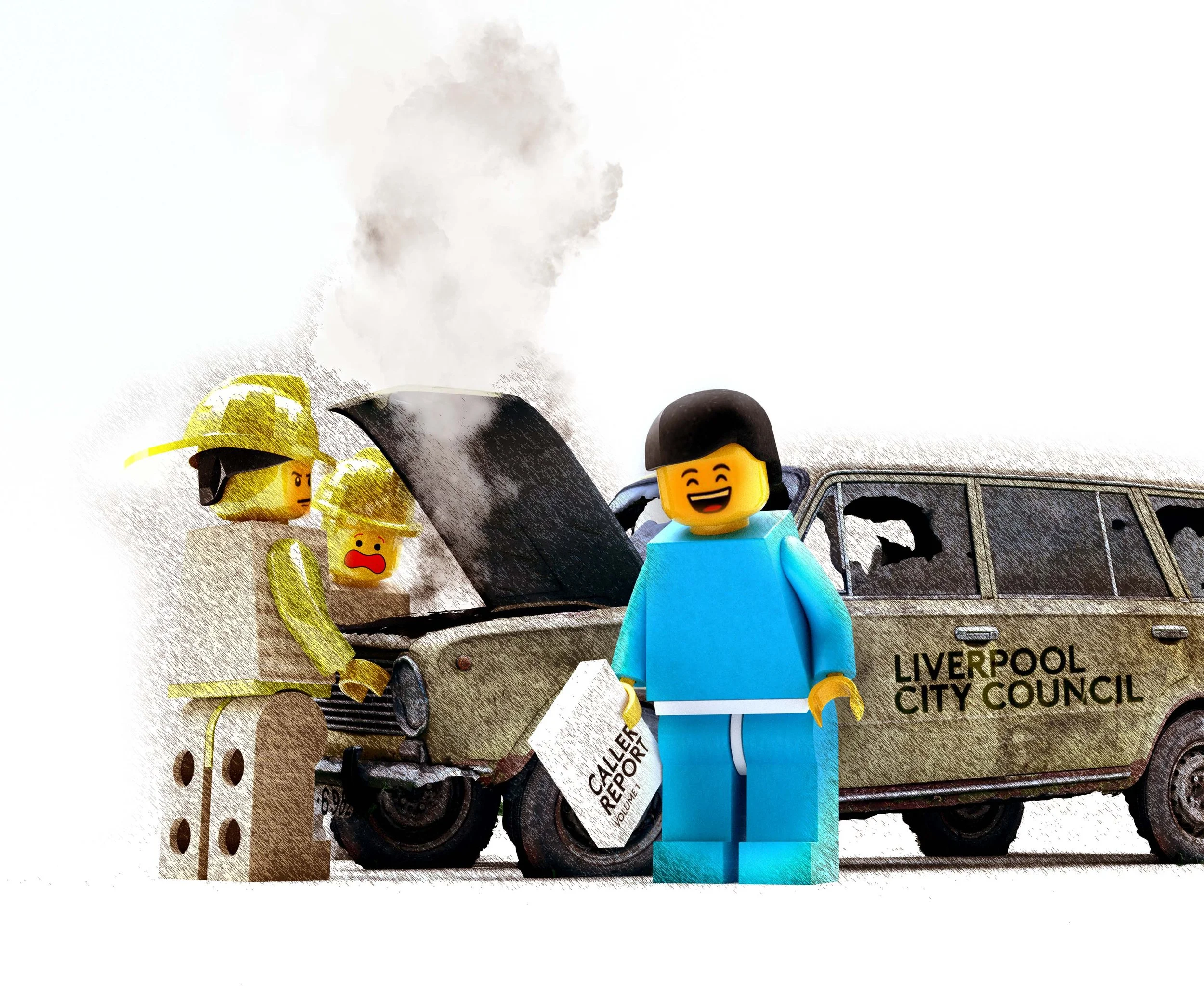Recent features
The Scourge of Northwesternism
In England’s Northwest, one city blooms while another withers on the vine. Manchester is reaching for the skies while Liverpool stares at its navel. A cancerous rot is eating away at my city’s self-esteem. It deserves a name. I call it Northwesternism.
Michael McDonough and Paul Bryan
Does anyone else notice that simmering sense of defeatism running through pretty much everything Liverpool does today? Whether it’s politics, culture or architecture there seems to be a crushing sense of meekness dragging down or at the very least blowing off course the city’s regeneration. You don’t have to look too far to find the evidence, from Liverpool’s proposed new stumpy, tall buildings policy, to the attempts to rejuvenate the high street with low-class tat like bingo and go-karts. Even our waterfront indoor arena was built patently too small to compete for the best music acts. We seem to have gotten good at hiding ourselves under a rock.
I noticed this sense of defeatism running through what was otherwise a riveting read by Jon Egan in his recent Liverpolitan article, ‘It’s Time to Get Interesting’. Examining Liverpool’s fallen place in the world, he searched for a solution and built it on the stoniest ground. Believing that “Liverpool’s claims to regional dominance is a boat that has long since sailed”, he called it an “unavoidable truth” that Manchester is now established as the region’s capital. Then from that premise he pitched an idea - unable to escape our fate as the North West’s second fiddle, we should lower our goals and find a workaround based on our outsider status and our sense of difference. He suggested we do this, by making ourselves ‘interesting’, something that comes naturally to us because it’s kind of in our social DNA. Austin, Texas was held up as a possible model to follow, a city which carves out its place in the world under the banner, ‘Keep Austin Weird’.
Now, I know that Jon doesn’t intend to cast Liverpool as a dancing monkey at a freak show, and you could argue that the economic data points to the truth of our cities relative position, but I don’t really see this strategy solving the myriad economic and social problems that Liverpool faces. It doesn’t sound all that far removed from the innovation strategies that have largely failed to deliver innovation. But my biggest problem with it is that it’s premised on pessimism. For me the race to become interesting or to live into our sense of cultural difference is just a way of rationalising our lowered position.
For me this all smacks of a cancerous rot eating away at Liverpool’s self-esteem. A long gestating idea that Liverpool cannot and will not ever again be more than an offshoot of the aspirations of another relatively small, regional UK city. Who the hell wants that? It’s a view that forces us to lower our horizons and settle for less and it has only one direction of travel - from city to village in countless, tiny steps.
Manchester at night. Just down the road things looked a little different. Chris Chambers / Alamy
I’m sad to say I increasingly see evidence of this sense of cultural pessimism all around me. They say, make no small plans, but we’re becoming experts at it, and you’ll find a whole breed of shamanistic professionals, activists or NIMBYs throwing shade on the very idea of planning big, going tall, and growing our economy. Sometimes they even reject the very concept of competing. This low growth rationalisation of defeat is usually wrapped in warm fuzzy words like sustainability or human-centred development, while a more optimistic view is seen as foolishly utopian or an apologetic for predatory capitalism. Yet just a few miles down the road things look quite different. And for those who want more, it’s often easier to just pack their bags and relocate.
Too much of our professional class appears to have succumbed to the Liverpool-killing long game of ‘regionalism’ - the modern face of managed decline. You can hear it in the language, and see it in the initiatives. It’s almost as if a subconscious decision-making 'culture' has pushed Liverpool to the periphery. Seeing yourself as secondary or even tertiary is now so ingrained that Liverpool no longer feels it can compete with what is merely another UK provincial city. So instead we see attempts to 'partner', 'work with’ and ‘align with’ Manchester-based institutions, which feels more and more like surrender rather than balanced cooperation.
Of course, ego won’t let us admit this and any self-respecting scouser will bristle at the very idea of Manchester as the regional capital; dark insecurities soothed by talk of world-class this and world-class that. Perhaps if we host Eurovision we’ll feel relevant again? But it doesn’t mean this humbling process isn’t happening or hasn’t already happened right under our noses. It’s all part of the perpetual grind of what I call ‘Northwesternism’. It’s part policy and part psychology – the forces of economic agglomeration, and political influence colliding with the endless boosterism of a perpetually on the front-foot city, culturally pump-primed by a media only too willing to play along. Drip, drip, drip bleed the jobs and opportunities; young lives transfused away. On the Liverpool side, we put the blinkers on, our taxi drivers famed for telling all and sundry ‘things are getting better’. Do they still say that? Over time, our inferiority complex becomes so ingrained that when the subject of the problematic Liverpool-Manchester relationship is brought up it’s laughed at or sneered at, dismissed as some kind of conspiracy theory. But then you just have to look at our graduate retention numbers. Deep down we just know.
“The idea that our two cities, separated by a mere 32.9 miles are not in competition with each other is a supreme act of gaslighting.”
Anthony Murphy of the University of Liverpool Management School recently posted on Twitter that “Smart young people from the city see it that way - flocking there for decent, well-paid jobs”. He wasn’t talking about Liverpool. Sometimes, being the capital is a state of mind. They have it, we don’t and they have the jobs too.
Our subconscious defeatism makes us smaller, lesser and this shows across so many sectors. We've almost got Stockholm Syndrome. I believe that Liverpool's malaise and rudderless direction have been a wonderful gift to Manchester's leaders creating a workforce that only ever travels east in the morning.
‘Northwesternism’, the passive acceptance that Manchester is the region’s dominant Silverback, is for me Liverpool’s greatest challenge in re-asserting itself as a major city. Our leaders should go into every regional partnership meeting with their eyes open, asking themselves ‘what’s in it for us?’ In Jon Egan’s article, he discussed how ‘Manchester is definitively and inexorably set on its own northern trajectory’. That being the case, why on earth does our Metro Mayor Steve Rotherham continue to insist on working so closely with Manchester’s Mayor, Andy Burnham? They have their own trajectory and set of goals, and they are not the same as ours. Increasingly, it feels to me as though Andy Burnham is entertaining one of the Greater Manchester boroughs – once Liverpool, now Manchester-on-Sea.
Do a little research and you’ll discover Mr Rotheram more often than not is stood behind Andy Burnham in public images and media features. Burnham is always positioned at the centre. There are no calls for Rotherham to be christened the ‘King of the North’; no bets placed on Steve Rotherham to be a future Prime Minister, and certainly no column in the London Evening Standard. You could ask why any of this matters, but in an era of image and soft power projection, Liverpool is suspiciously absent from the national conversation, a recommended city break in the Telegraph, but fringe where it counts.
Until Liverpool rejects ‘Northwesternism’ and the slow but steady spread of Manchester’s well-oiled and expanding ‘psychogeography’, then Liverpool cannot confidently look outward to the rest of the world as it will be forever undermined on its own doorstep.
I think we have to wake up and fast. And now Levelling Up Secretary, Greg Clarke, has just invited Sir Howard Bernstein, Manchester City Council’s former Chief Executive to help draw up a vision for our city’s future, something our own council has singularly failed to do themselves. He’ll be joined by Judith Blake, former Leader of Leeds Council, Steve Rotheram and an as yet unnamed person from the business sector. Excellent administrators though they are, I can’t help wondering if Howard and Judith will have Liverpool’s best interests at heart. Maybe they will. We can hope for the best. Would Bernstein propose anything that might weaken Manchester’s grip given he spent his whole career building their success? Would he want to champion our promising games industry or eye it as yet another prospect to wine and dine? Would Judith support a significant expansion of our legal sector given Leed’s strengths in that area? At the very least, we need to stay awake to our own interests at all times and turn a deaf ear to those who say competing is for chumps – that Liverpool can exist in its own utopian bubble where the lion lays down with the lamb.
“This low growth rationalisation of defeat is usually wrapped in warm fuzzy words like sustainability or human-centred development, while a more optimistic view is seen as foolishly utopian or an apologetic for predatory capitalism.”
MANCHESTER nakedly pursues its own interests. There’s nothing wrong with that – I’m not passing moral judgement but the idea that our two cities, separated by a mere 32.9 miles are not in competition with each other is a supreme act of gaslighting. The fact that so many members of Liverpool’s political and business communities have fallen for it, like hostages besotted with their kidnappers, is evidence of either a stunning lack of self-awareness or a cynical judgement on moving as the wind blows, taking advantage of a new reality while tucking the loser in bed and whispering in their ear that everything will be alright.
The decision in 1997 to approve Manchester Airport’s second runway over expansion at Liverpool was not in our interests. It was in theirs. The building of Media City in 2007 with its gravitational pull on all TV production led to the closing of our own Granada TV Studio at Albert Dock. It was not in our interests. It was in theirs. The conscious derailment by the Greater Manchester Combined Authority in 2012 of the Atlantic Gateway strategy which would have seen multi-billion pound investments along the Ship Canal land corridor including at Liverpool and Wirral Waters was torpedoed in favour of a focus on city regions and what became the Northern Powerhouse with the cheques signed off in George Osbourne’s Tatton constituency. It sank the prospect of region-wide regeneration in favour of the city to the east. It was not in our interests. It was in theirs. The decision to build two gold-plated HS2 stations in Manchester and Manchester Airport (and none in Liverpool), given the nod in 2013, meant an unnecessary dog-leg and longer commutes between the cities. It was not in our interests. It was in theirs. Not that Joe Anderson would have noticed. He was like a blind man in a room full of alligators. Food for the predators. But the piece de resistance dates back to 2001 and the signing of the hard to believe Manchester-Liverpool Joint Concordat Agreement by the leaders of the two cities under the watchful eyes of the then Deputy Prime Minister, John Prescott and the supposedly neutral North West Development Agency. Inspired by a Salford University academic, the agreement proposed to end our ancient enmity once and for all. As noted in the Independent, the Concordat bluntly concluded that Manchester was the "regional capital" and there is "little sense in Liverpool seeking to challenge that reality". It must have been hard to suppress the sniggers. Whole industry sectors were carved out for non-competition, the kind of ones that generally required office space and high paying skills. Liverpool’s “unique attributes and distinctive economic strengths” won it tourism and culture, and then Manchester, with a belly full of everything else, went after that anyway with its £114m government funded Factory arts venue and it’s Art Council supported Manchester International Festival. Needless to say this sorry document - the Joint Concordat - was not in our interests. It was in theirs. That a Liverpool Council Leader – Lib Dem, Mike Storey, saw fit to sign such a blatant sell-out of his constituents’ futures shows that he was nowhere near as clever as he thought he was. He was played pure and simple. Either that or he had a masochistic streak, though the fact he ended up in the House of Lords suggests he wasn’t the one feeling the pain. The story doesn’t end there of course – the drip, drip, drip of consequence – of capital and talent continuing to haemorrhage away. Companies like Castore, Redx and Biofortuna. The grass definitely greener on the other side.
I can’t condemn Manchester for acting in its own interests. I just want the same for Liverpool. I want us to wake up to our interests. To fight for them and to have the good sense to know when we are being had. To stop being a patsy. To stop playing the fool. Talk that cities don’t need to compete is fitting of the dunce cap and I think we’d all prefer to wear more desirable head gear.
“That a Liverpool Council Leader – Lib Dem, Mike Storey, saw fit to sign such a blatant sell-out of his constituents’ futures shows that he was nowhere near as clever as he thought he was. He was played pure and simple.”
The recent spat between local councillors and developers at Waterloo Dock was a symbol of another fine mess we’ve built for ourselves – another expression of Liverpool’s ability to trip on its own feet. Amongst the general rot and dereliction, we built a complex nest of low aspirations to house not Canada Geese, but local representatives, who like squawking chicks pretended their advocacy of ‘blue space’ was a defence of high aspiration and ‘world-class’ heritage. That phrase again. It was nothing of the kind.
The enraged opposition to the development of what is to any sane person a piece of wasteland was deeply embarrassing to watch. Frustrating attempts to encourage inward investment, councillors cronied up to self-interested NIMBYS who were out to protect their own river views. In doing so, they further entrenched an anti-capitalist, ‘scousers versus the world’ mentality. By pitching local people against ‘greedy developers’ and roping in heritage ‘concerns’, they found a new way to frustrate Liverpool’s aspirations, and in the process convinced some poor sod from the Planning Department to embarrass himself at the appeal. Thankfully on this occasion reason won out and the determined developer won the day. I suspect we’re wiser to their tricks now. The ‘build nothing’ types will find it harder to play their games in the future.
Rabbits were suddenly ‘discovered’ in Bixteth Gardens by campaigners against an office development. Photo by Gavin Allanwood on Unsplash
Even with the Waterloo Dock development getting over the line, there does seem to be a sense of red brick, low-rise defeatism in the city’s modern architectural landscape. Where cities like Manchester and Birmingham go big, Liverpool has managed to shroud its lack of urban aspiration in a thin veil of heritage and ill-informed talk of ‘human scale’. While Manchester and other progressive cities throw up new developments like confetti providing new homes, jobs and office spaces for international companies, Liverpool’s local councillors, like Labour’s Nick Small, shamefully protest against developments such as Pall Mall, a long overdue project to bring Grade A office space to a city that has one of the smallest portfolios of commercial floorspace in the country.
Why did the protesters object? Rabbits. Now I’m all for the protection of wildlife but the former Liverpool Exchange station site is not the setting for Watership Down. I’d much rather see our public institutions looking to attract companies out of rival conurbations and into our own central business district, incentivising them to base in new, large-scale, glass, brick and steel office blocks. But that sounds too much like hard work. I guess it’s much easier to rationalise doing nothing by weaving an almost religious acceptance to it. Building is for other cities, it’s not for us. We have another vision. What is it? Don’t know.
What Liverpool needs desperately is to find leaders in business, politics and the community who are unashamedly ambitious. But what does that ambition look like? Ambition and aspiration for Liverpool should be in the form of a real, tangible plan to re-position the city at the forefront of northern politics and to openly and confidently shun any notion of northern capitals in Manchester. In fact, I would suggest making it a core strategy to pull as much investment, business and talent away from our northern neighbours and London as is humanly possible. Let them know they are in a fight. We Come Not To Play. Liverpool gains next to nothing from ‘collaboration’ with Manchester, never has and never will. If anything, in our naivete we are just helping to reinforce this self-defeating status quo.
Michael McDonough is the Art Director and Co-Founder of Liverpolitan. He is also a lead creative specialising in 3D and animation, film and conceptual spatial design.
Share this article
What do you think? Let us know.
Write a letter for our Short Reads section, join the debate via Twitter or Facebook or just drop us a line at team@liverpolitan.co.uk
Is profit a dirty word in Liverpool?
Touting fairness and social purpose, Liverpool's city leaders have become obsessed with ethical business practices at the expense of investment. So how did profit become such a dirty word?
Paul Bryan
Liverpool is, as the oft-told story goes, famously a socialist city. From the powerful campaigning firebrand, Bessie Braddock in the 1950s, through Derek Hatton and The Boys from the Black Stuff all the way to union-supremo Len McCluskey, and the huge, open-air campaign rallies which treated Jeremy Corbyn as saviour. Bar the occasional intermission from the Liberals, Labour has pretty much had its own way since the Beatles broke up.
One common thread through the politics of all those years is a strong dose of what I’d call working class patrician moralism – with the leaders of the movement strongly convinced they know what’s good for the rest of us. As Steve Fielding noted in The Spectator, for better or worse, Labour has always been on a moral crusade, with its core supporters convinced they are on the right side of history, particularly in the fights against inequality, and for social justice. Occasionally, this has taken a semi-religious turn such as when ex-Prime Minister, Tony Blair declared himself ‘my brother’s keeper’, though this moral high-handedness may also have played its part in Labour’s last historic general election defeat under Corbyn – with Blair himself urging the party to stop ‘deluding ourselves that belief in our own righteousness is enough’. In Liverpool though, this ‘Labour knows best’ quality appears to be a home banker for success at the ballot box, even in the face of some quite outrageous revelations from the recent Caller Report into the workings of Liverpool City Council and the office of ex-Major Joe Anderson.
Aspiration, anyone?
“Why are people buying yachts? What do you need a yacht for, for heaven sake?”, exclaimed Liverpool City Council’s now Deputy Major and economic lead, Jane Corbett in a public debate hosted by The Royal Society of the Arts on one of those glorious pre-Covid days of 2018. ‘Because you might want one’ didn’t seem like the kind of answer, Councillor Corbett would give the time of day. Clearly there are some things one just shouldn’t spend your money on. The moralistic tone remains alive and kicking.
A deep ideological failure lies at the heart of the city region
Quibbles about the advisability of ocean-going luxuries aside (from a councillor representing a maritime city), there was something else notable in that discussion. Leading a debate on ‘How not to run an unfair business’, was a certain, Charles Wookey, CEO of charity, A Blueprint for a Better Business (BBB). You may not have heard of them, but Liverpool City Council certainly have. Their ethical business pitch has been adopted wholesale by the city’s leadership in both the pre-and post Joe Anderson days. Liverpool’s ‘Inclusive Growth Plan for a Stronger, Fairer City’, published in 2018 along with their Council Procurement Policy, and Fair City Policy were straight out of the BBB playbook; as is the just published 2021 City Plan by Team Liverpool, a collection of the city’s leading lights in the public and third sectors. The adoption of these principles which coalesce around the idea of ‘fairness’ is likely having a profound effect on the city’s approach to attracting investment and its hopes for post-Covid recovery. From informing the overall meta-diagnosis of Liverpool’s economic problems and its preferred solutions, to the instigation of new restrictions on the terms under which the Council is prepared to issue contracts of work, ‘fairness’ is the lens through which the city’s future opportunities will be filtered. Or at least, that is the stated intention. Moonlighting as a member of Blueprint’s Advisory Council, it’s likely Councillor Corbett has played the key role in drawing Liverpool’s leaders into BBBs way of thinking and their (albeit free) management coaching services.
The high priests of purpose-driven business
Quite how this adoption of fairness may affect Liverpool’s economic future, is something I’ll get to later, but first it’s worth asking, is there anything sinister about this relationship between Liverpool’s leaders and Blueprint? No. There’s no conspiracy here. But is it something we should be worried about? Perhaps. After all, if Blueprint have the ear of those responsible for driving much needed investment into the region, it’s important to understand what is being advocated and what effects it’s likely to have on the ground. Especially because BBB have a somewhat pessimistic view on the traditional role of the private sector and are keen to change the way it works. In essence, they believe the world needs a ‘system change’ in which businesses are driven, not by profit, but by a ‘purpose’ that benefits society. They want to see our economic system “optimised for human wellbeing and a sustainable eco-system”, rather than for growth. As Wookey goes on to explain, they are out to displace two dominant ideas – “one, that the purpose of business is to maximise profit, and the other, that people are self-interested and motivated simply by money, status and power.”
For Blueprint For A Better Business, the search for profit, allied to that pesky desire to want more (growth) is put in the dock, tried and found guilty of crimes against society. You’ll be familiar with the narrative because these days it passes for common sense. The sins of business or at least large corporations, we’re told, are legion. Hooked on short-term profits and thinking of nothing but shareholder value at the expense of everything and everyone else, large businesses are seen as the fox in the henhouse, in need of some serious therapy to get over their compulsion to be a destroyer of worlds. If you are haunted by nightmares about the excesses of capitalism – from the oil spills of Deep Water Horizon to the sweat shops of Thailand, this sentiment will strike a chord. Closer to home – zero-hours contracts, glass-ceilings and the peddling of sugary drinks to the obese are just the tip of a well-rounded rap sheet of sin.
You could be forgiven for thinking these ideas sound kind of socialist or green-socialist and you can understand why these sentiments might appeal to those of a left-wing persuasion - the Left have been hankering for a system change since, well, forever. But and this is interesting, behind BBB lies not an activist fringe group, but a team of hardened senior business professionals. Blueprint count amongst their number former executives from organisations such as Unilever, M&S, UNESCO, Goldman Sachs and the TUC. And they were founded by an Archbishop (of Westminster). If anything, their roots lie in Christian morality and the belief that everybody should be treated with dignity and that we are never more fulfilled than when in service to others.
An unlikely moral alliance
So, what you find is two things coming together that can comfortably live in an accommodation. A moral desire to be and do ‘good’ in business circles and a deep-felt criticism of the failings of the market on the Left. From both angles, they feel the need for something new. But, and here’s a bit of a kicker – outside of the odd Extinction Rebellion march and the extremes of Momentum, nobody is really asking to completely up-end capitalism (let’s face it, not even the Chinese). Partly, because we’ve seen some of the alternatives and they weren’t great. But also, because well … we need business and everyone knows it – especially those who work in one. Or buy products from one. Or who have the good fortune to spend the money raised from taxing them. Money makes the world go round. So, with a deep breath, the conclusion is reached - what we need, it seems, is a Faustian pact.
And that’s where Blueprint For A Better Business comes in. They take the high moral ground and try to translate it into some kind of actionable programme for business leaders and the politicians who regulate them. And the price of the ticket is simply accepting that making a profit is not enough. Or even a worthy pursuit. It’s something that is allowed but only as a reward for achieving a definable social purpose as part of a renewed social contract between business and society. Even then profits are only acceptable if they are ‘fair’.
As a result, for businesses, dealing with the local authority becomes more challenging. If you want their ear and their help, increasingly you need to show you’re hitting or at least on a journey to hit Blueprint’s five core principles – that you’re honest and fair; a good citizen; have a social purpose, are a responsible employer and are a guardian for future generations. Sure, some of those translate to perfectly decent goals such as welcoming more scrutiny, achieving the Real Living Wage or paying your taxes on time. But many others are just plain subjective. Who gets to decide what is ‘fair’? And what qualifies those who sit in judgement?
It’s so tempting for public authorities to create a wall of additional requirements that make it harder for businesses to focus on their core task – and these are additionally burdensome for smaller organisations who just don’t have the bandwidth to keep up. What’s more, because fairness (whether outcomes or in process) is so subjective, prejudices can be projected onto the process of deciding who is and isn’t a worthy business partner, which can have disastrous unintended consequences.
Monetising social value
How’s that for a ‘pro-investment environment’? Can you imagine the Google’s and Apple’s of this world knocking down the city’s door, with those kinds of trade-offs? How about Amazon? You know, maybe they would. After all, we live in the age of the activist CEO. Of IKEA and Grolsch suspending their adverts from the new TV broadcaster, GB News, because the station didn’t match their ‘humanistic values’; while in the light of the Black Lives Matter protests, racial equality is now used to sell sausages. I doubt there’s a single business school that isn’t running modules on Corporate Social Responsibility (CSR). The mantra that ‘Being Good is Good for Business’ is somewhat of an unchallengeable tenant of acceptable belief – even if the data is less convincing.
Of course, it does raise the question, if you are being good to be seen to do good so that you can personally benefit, are you still doing ‘good’? For anyone who has seen the documentary, The Corporation (2003) or read the book, you’ll know that big business has been described as psychopathic for this very reason. They have a tendency to reflect back what they think you want to hear, so that you will do what they want you to do (buy their products). But to be sceptical for one minute, the morals and values to which business attaches itself, tend to be fluid. As writer, Nick Asbury writes in his incredibly insightful article for The Creative Review, when brands like Dove, Pepsi and McDonalds mix social issues with a sales message, not only does it come across as crass, but “Whenever you see a brand adopt a cause – whether it’s Andrex doing Clean or Dove doing Feminism – it’s always with the zeal of a recent convert. They are going to be the one to lead the conversation…because brands always have to cast themselves as the hero.” Damn right!
Can councils avoid being gamed?
Of course, councils like Liverpool know that when they are encouraging employers to act fair and be enlightened and ethical in their dealings, those businesses (especially the big ones who have more budget and resource) are more than capable of gaming the system. For example, paying for trees to be planted to counter-act emissions is generally seen as ‘greenwash’. Donating to a foodbank when you are squeezing the life out of farmers would likely go in the same category. All it takes, is a small charitable donation, a glossy video and social media campaign and hey presto, you are on the right side of the moral maze. Even better if you managed to cut your plastic use by 10% or start a conversation about body shape. This does point to a certain naivety in BBBs position and that of our elected local representatives. Who really wants to be taking moral lessons from a business? Did anyone vote for them? What is it about their constitution that makes us believe, that when the chips are down – their ‘purpose’ is anything other than to do the thing that allows them to continue to exist – making a profit?
I should point out that the purpose of this article is not to attack business – but to defend it from those who would wrap it up in unnecessary restrictions sourced from their own Instagramable prejudices. There are a host of dangers hidden under that appealing label of ‘fairness’.
CEOs – pack in the inferiority complex
But first, business leaders need to remember that their companies do already have a ‘social purpose’ and it’s one they don’t have to apologise for. Successful businesses provide products and services that customers want. And those outputs make people’s lives better – saving them time, bringing pleasure, opening up new opportunities and experiences. They innovate new technologies and processes transforming productivity and delivering progress across society. They create wealth – investing in jobs which transform lives, because there is one thing you can know for certain – if you want to give your life some purpose and you haven’t got a job, the first thing you should do, as psychologist Jordan Peterson recommends in his book, 12 Rules for Life – is get a job. No matter how crummy the job, you’ll feel better about yourself and ready to make the next step. The profits of business also fund every social programme in existence - from educating the next generation, to the safety net of social care. Maybe our CEOs should spend less time worrying about their lack of purpose or signalling their virtue and more time remembering that their core profit-making mission is one that delivers more benefits to society than any social state-funded programme. They do a magnificent job of making billions of lives better. And they do it, by tapping into the core human motivation to improve your lot. Is it time to resuscitate Gordon Gekko?
Some investors not welcome in Liverpool
“If Amazon isn’t on a journey (of improvement), no, I wouldn’t want them anywhere near us.” Back to Liverpool’s Deputy Major, Jane Corbett and that public debate. She was asked if Liverpool would follow New York’s lead and reject a big business like Amazon if they were looking to invest. She’d already said she takes a tick list of the 5 core Blueprint For A Better Business values around with her when she visits local companies. “We’d sit down and have a talk… Are they going to benefit the city? Are they going to pay us proper business rates? Why are they coming to Liverpool? Because we’ve got people so desperate, they might work for them?”
Let that sink in. Some people might be so desperate that they’d choose to take a job. The Councillor would save them from that misery. BBB values being used to turn away investment.
Leaving with a pocket full of dreams and returning with the same.
Corbett talks about commerce in very moral terms – good investors, good money, good businesses - presumably in contrast to bad investors, bad money and bad businesses. Perhaps this is not entirely surprising in a region still reeling from revelations about alleged cronyism, property deals gone wrong and lack of accountability under ex-Major Joe Anderson. But, given Corbett’s background in the Labour movement, it seems plausible that her moral qualms are founded at least in part by a generalised feeling of antipathy towards the dirty business of business. An instinct that at best, sees private enterprise as an unfortunate price to be paid in return for a state-funded shopping list of social provision. Back to that Faustian pact. If you’re going to sup with the devil, use a long spoon. Or in this case, an obligation for business to be purpose-led, not profit-led. I wonder what the Dragons Den presenters would make of that? Maybe they’d agree? The plan, according to Corbett is to show BBB definitions of what makes a good business to the next generation of young people so that “hopefully it becomes embedded in the city.”
But what does it mean in the here and now?
In one aspect, Liverpool is very far from unique. In 2013, central government introduced the Public Services (Social Value) Act, which requires all those responsible for commissioning public services to think about how they can derive wider social, economic and environmental benefits from any contract. Public servants keep a keen eye on additional benefits for their area or stakeholders – be it jobs and apprenticeships, green initiatives, equality and inclusivity drives and so on. The public procurement process has become more complex as a result and more subjective as businesses applying for work need to provide evidence for a raft of measures that fall outside their core mission to provide a good quality service or product at the right price. The government freely admits councils have sometimes struggled to implement it, and issued an updated Social Value Model in December 2020, which for now will be used by central government departments only.
The findings of the recent damning Caller Report into Liverpool City Council however, showed how good intentions can deliver poor outcomes. The report, led by an independent inspector, found “multiple apparent failures” in the council’s highways, regeneration and property management functions. Plots of land worth over £1m were sold for £1 plus overage – a share in future value increases. Sixty-five property deals negotiated by the council were examined by the inspector and problems were found with all of them.
What starts in the head - An economic misdiagnosis?
As reported in PlaceNorthWest, Caller questioned how social value had been interpreted under Joe Anderson’s administration - “the mayor’s…concept of social value was best achieved by employing contractors with a Liverpool postcode base” – which resulted in deals that failed to reach the council’s statutory duty to achieve best value. There you have it. Decisions founded in a moral position to extract social value (by choosing Liverpool-based suppliers) resulted in less value for local taxpayers. The ideas in your head shape the reality on the ground. Attempts to pass off the administration’s inadequacies as merely an embodiment of the ‘bad apple’ theory – where all the faults are caused by the actions of a few rogue individuals, seem unpersuasive as a complete explanation.
What if some of the biggest flaws in the Joe Anderson administration were ideological, rather than just managerial? What if their understanding of what’s ailing the Liverpool economy and what it needs led them to make bad decisions? What if those flaws are still present today under the Mayorship of his replacement – Joanne Anderson (no relation)? After all, though she may have changed the makeup of the cabinet – many of the councillors were elected under both leaders. What if Liverpool Labour is the problem? And what if the council’s relationship with Blueprint For A Better Business is the clearest indication yet of what’s going wrong?
Snubbing the PM, for the people
"I can never respect somebody who won't apologise for what he said…And he won't do that and until he does that, I've refused to shake his hand when it was offered to me last year and I'll continue to do that." So said Steve Rotherham, the recently re-elected Liverpool City Region Metro Mayor talking about his relationship with the country’s most powerful man, Boris Johnson, the UK Prime Minister. As he explained on the BBC’s Political Thinking Podcast, the bad blood dated back to the 2004 Spectator article about the Hillsborough disaster that was published (but not written) by Johnson when he was the magazine’s editor.
The piece had wrongly claimed the city was in denial about the role "drunken" fans had played in the 1989 tragedy and had a tendency to "wallow in victim status". Understandably, the article caused wide-spread offence throughout Liverpool.
Talking about the work Steve had done with Boris over implementing Covid testing trials in Liverpool, Steve concluded, "it was really difficult for me to do business with somebody I had no respect whatsoever for, but I had to do the right thing... for the people in the Liverpool City region."
Did Steve do the right thing? Putting aside the question of whether Boris has already apologised (possibly repeatedly), the primary responsibility of a Regional Mayor is to put the interests of their constituents first. Steve comes across as a moral and decent man but on this occasion, he may have put his personal feelings ahead of his duty. Alienating the Prime Minister, who as prize-giver-in-chief has more influence over the direction of government investment than anyone else, doesn’t feel like the pragmatic move. So far, the UK government’s ‘Levelling Up’ agenda, which has seen government departments relocating from London to other parts of the country, has by-passed Liverpool. It is certainly not the first time the city region has missed out on big-ticket investments. From High Speed 2 to the relocation of the C4 headquarters to the north, or even the new UK Infrastructure Bank, Liverpool remains off the map.
Sticking it to the Tories was also a favoured pastime of Joe Anderson, who bitterly and publicly complained about the effect of Tory cuts to the council’s budget. Many times, he took to the airwaves to gripe; sometimes coloured with doom-laden predictions about the inevitability of riots. Even on the occasions when he had the then Prime Minister, David Cameron’s attention (for once) he quickly found himself ensconced in tit-for-tat battles, such as the time in 2013 when the goal of promoting the inaugural International Festival of Business was overshadowed by public arguments between the two men about the city’s rough treatment by the government. How to win friends and influence people it was not. Playing to the gallery it certainly was.
Lack of belief results in puppets
What ties the tales of Steve and Joe together is that sense of outraged moralism triumphing over pragmatically doing what needs to be done to get the rewards for your people. Sometimes, however unpalatable, you have to suck it up. And maybe, if you’ve stopped really seeing the prize on offer and how big it could be, and just how much you are missing out on – well then maybe you’re just less motivated to try. Maybe your words about aspiration and the ‘best days being ahead’ are hollow and just for the gallery, because deep-down you don’t believe it yourself. While Joe Anderson, when in power, was playing with (giant) French puppets (x3), grandstanding about Tory cuts, and messing about with bus lanes, other regions were taking a more pragmatic view, doing the hard yards in Westminster and private sector boardrooms to secure the influence which led to vital investments such as the nearly £40m Manchester pocketed for establishing the National Graphene Institute in 2015 or the 2022 Commonwealth Games which went to Birmingham. It’s hard to think of many (any?) Liverpool equivalents as the leadership tended to focus on ultra-short-term photo-opportunity wins such as the International Business Festival, now much shrunk and rebadged in the favoured moral terms, ‘Good Business Festival’.
Even Joe’s annual trips to MIPIM, Europe’s largest property convention, which were often treated to excitable rolling commentary and great fanfare in the Liverpool Echo, tended to result in little more than glossy CGIs of the still largely unbuilt Liverpool Waters. Leaving with a pocket full of dreams and returning with the same has generally been the order of the day. So, either Joe’s team were not very good at pitching or coming up with investable ideas, or they didn’t try hard enough. Maybe, it just didn’t seem that important to them.
In Liverpool business circles, the talk never strays far from the subject of skills, or more precisely the lack of them. When not re-locating their businesses out of the region like premium sports brand Castore did only recently, CEOs like Asif Hamid of Wirral-based, The Contact Company are left lamenting the shallow talent pool and the slowing effect it has on growth. The worry is that too many leave school without qualifications and families that have never seen anyone attend university become cut-off from the best opportunities. But there is nothing new in this. Liverpool has suffered a brain drain for decades –as many of the best and brightest are forced to seek opportunities elsewhere. Even today, with its healthy student population, the city has a graduate retention rate lower than many of its city rivals. There’s no mystery here. Jobs are the trigger for rising educational attainment. Fail to build a diverse and deep job market and those that can, will move elsewhere.
Foreign Direct Investment (FDI) 2020
Ranking UK cities & towns by the number of FDI-financed projects they have secured (sub-selection displayed only). Liverpool ranked 14th between 2011-2020 but has slipped to 17th in the last year of recorded data.
Source: EY Attractiveness Survey 2021 (UK)
Liverpool’s economic balance sheet
There are positives to talk about the Liverpool City Region economy – the growth of the port, rising demand for industrial and logistics space, the successes of the visitor economy and the beginning of a revival in health care sciences. The unemployment rate has fallen from 10% to 4% since 2014 and the number of people holding degree level qualifications is slowly on the rise. Plus, the alarming decline in total population has thankfully been put into reverse. All to the good. But beware the relentless positive spin from those naturally invested in the regeneration game. A cold look at the other side of the balance sheet reveals that Liverpool is still grossly under-performing. The Draft Industrial Strategy published by the office of the Metro Major reveals the City Region is still in need of an economic miracle and sets out the ‘underlying fragility’ of the economy. Liverpool is the fourth most deprived local authority in England, with a life expectancy 6 years lower than the national average. Its employment rate (even pre-pandemic) was also lower than average and the ONS estimates 51,000 of its residents earn below the Real Living Wage. The city of Liverpool ranked 17th for Foreign Direct Investment in 2020 placing it below such economic luminaries as Peterborough and Northampton and only one place above Newport. It’s doubtful if it ranks much better for Domestic Private Investment, though it’s hard to tell for sure as the statistics tend to get unhelpfully rolled into the North West as a whole, likely hiding a multitude of inequalities. The office take-up statistics, a solid measure of the strength of any city’s business activity are miserable. Of the UK’s big nine cities outside of London, Liverpool has the 8th lowest 10-year average (approx. 533,000 sq feet per year) compared to over 2,000,000sqft in Manchester. That’s a crippling 43% below the average take-up across the nine cities. It also commands the lowest rental rates. The building of new stock outside of the recent Paddington Village development is all but non-existent. And that was true long before anybody had heard of Covid. Perhaps most worryingly, Liverpool’s productivity rates which measure the output per worker (Gross Value Added per head) are only 74% of the UK average. Too many of the region’s employment opportunities are focussed on low productivity sectors and Liverpool just doesn’t have anywhere like enough representation in the high-tech industries of tomorrow. As Rafa Benitez, the manager of Liverpool’s two football clubs might say – FACT.
More investment please
What should we conclude from this barrage of data? Liverpool needs more investment like a vampire needs blood. It needs more of everything. More investment from the state, from the private sector, from overseas, from home-grown businesses. It needs more access to venture capital. It needs to diversify, and attack sectors in which it is currently losing out to others, rather than throwing up its hands in defeat and forever banging on about the ones where it is strong now. It needs to step up and compete with its rival regions head-on rather than accepting a subsidiary role. Be better at playing the ‘influence game’. Resource key development and regeneration functions properly with the right level of expertise. Be ambitious and demanding. Fight the right fights for its people. But its leadership won’t do what’s needed as long as it is hooked on the wrong thing – its focus on fairness and the metrics of inequality, not realising they are the symptoms, not the cause of this prolonged failure to attract enough investment, enough ‘stuff’.
Average annual sq ft office take up in the Big Nine Regional Cities (2011-2020)
Source: The Big Nine, Quarterly update of regional office activity
Rationalising low aspiration
Liverpool’s current obsession with morals and good business ethics is at the heart of this misdiagnosis. It is the rationalisation of limited aspirations. Accepting the idea that economic growth is a problem, not a solution and seeing business as something which needs to coached away from its destructive tendencies rather than the source of wealth creation, is forcing the city down a dead-end. What they are left with is a focus on redistribution, because they can’t see the transformative power of growth to improve people’s lives. Fairness, while worthy, becomes about moving the counters around the checkerboard. Fiddling with the rules, but never really changing the game. The leadership has accepted an anti-business, low aspiration narrative because it is misdiagnosing the region’s core problems and its own role in adding to them.
Fairness means accepting defeat
When a moral focus on being a good citizen meets a left wing reflex to identify inequality as the primary social ill and businesses and capitalism as the source of those problems – you end up with a potentially toxic investment agenda that is christened under the name, ‘Fairness’. Instead of understanding that increased investment drives social opportunity, you instead end up fixating on redistribution issues – chasing social justice by achieving a more equitable sharing of the same level of resources that have already proven themselves to be inadequate. As definitions of what is ‘fair’ shift you find yourselves creating a mountain of regulations or informal requirements which make it ever harder for business to act in an entrepreneurial way, particularly prejudicing those small organisations that don’t have the bandwidth to play the game.
But worse – you’ve stopped even trying to grow the cake in any meaningful way, because without realising it, you’ve accepted the limits of low aspiration – your efforts to attract investment become sporadic and half hearted – besides, who wants new jobs when we have a climate emergency on? They’ll only make things worse.
A deep ideological failure lies at the heart of the city region and particularly Liverpool’s sub-par performance. One that sees red lights and limitations everywhere. One that accepts low ambitions as if they were part of the natural order. One that doffs its cap to other cities, for want of imagination about what could be. The kind of ideological blind-spot that leaves our leaders wondering why anyone might want a yacht; that diagnoses symptoms as cause and defaults to lazy moralising about the common good, while wrapping businesses up in ever more unprofitable, energy-sapping restrictions. The city region needs to wake up and kick out the snake-oil salesmen of purpose-driven business from the corridors of power. For a maritime city, it has long since hit the iceberg. It’s time to stop re-arranging the deck chairs. This Titanic needs more lifeboats. And its marinas need more yachts.
Paul Bryan is the Editor and Co-Founder of Liverpolitan. He is also a freelance content writer, script editor, communications strategist and creative coach.




































